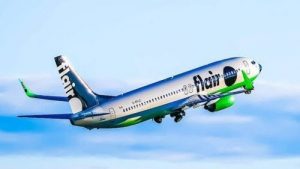 It’s pretty much unanimous.
It’s pretty much unanimous.
The National Airlines Council of Canada (NACA), which represents the country’s largest carriers including Air Canada, Air Transat, WestJet and Jazz, as well as the Air Transport Association of Canada, representing all types of carriers as well as flight training organizations, plus industry suppliers - have all banded together to condemn start-up Flair Airlines’ request to be exempted from Canadian ownership requirements, even on a temporary basis.
Earlier this month, as Open Jaw has reported, the Canada Transportation Agency (CTA) determined that Edmonton-based Flair Airlines may be in violation of the law that requires it to be controlled by Canadians. The airline faces the loss of its operating licence to fly in Canada if the CTA’s preliminary ruling, first issued on 03MAR, is finalized.
A letter from Transport Canada to industry participants says the CTA has given Flair 60 days (until 03MAY) to respond to concerns and its findings that Flair “may not be controlled in fact by Canadians and may, therefore, not be ‘Canadian,’ as defined in the Canada Transportation Act.”
Flair is 25-per-cent owned by Miami-based 777 Partners, and its five-person board of directors includes three Americans who either own part of 777 Partners or are employed by 777 Partners.
CTA regulations say that a Canadian airline that flies domestically or internationally must be 51-per-cent owned by Canadians, with no single foreign entity owning more than 25 per cent. Additionally, foreigners cannot exert control over the airline, a situation the CTA calls “control in fact.”
Flair denied any violation of Canadian laws in an email to The Globe & Mail, however has requested an 18-month exemption from the regulations to address the CTA’s concerns.
That has the rest of Canada’s aviation industry crying foul.
NACA and the Air Transport Association of Canada issued a joint statement 19APR, “calling on the Government of Canada to reject Flair Airlines’ request for an exemption.”
“Fundamental Fairness” and “Consumer Confidence”
Their reasoning is twofold.
The first is how domestic ownership ensures a strong Canadian aviation sector. “These laws ensure that companies make a firm commitment to Canada, protecting the industry’s viability, incentivizing growth and new routes, allowing for expansion and building strong networks across the country and globally that collectively make up a strong ecosystem."
Their statement goes on to add, “Domestic control and ownership… ensures that there is fundamental fairness and protects against one diluted or foreign owned business causing harm to the competitiveness of the whole industry.”
In addition to an appeal for fairness in requiring newcomers to play by the same rules as other players in the aviation field, the statement warned of the impact on travel recovery.
“If granted, this unprecedented request would allow Flair to continue operating outside the bounds of existing Canadian law, setting a troubling precedent while also threatening consumer confidence in the sector, at a time when the travel industry is working hard to provide a strong and sustainable future for air travel for Canadians.”
Flair Fires Back
The Globe reports Flair’s fiery response to the industry statement:
“It’s no surprise that Canada’s big air carriers want Canadians to pay more for airfare, sow confusion with passengers and eliminate the competition,” Flair's statement said. “No matter how much they want to take us down, Flair is here to stay.”






